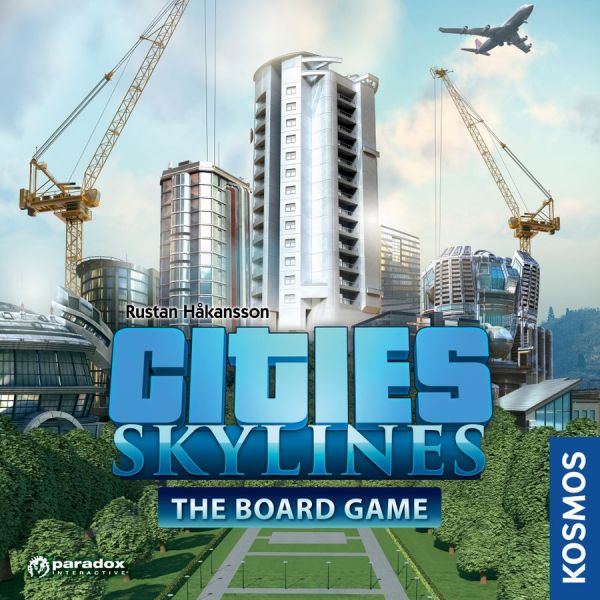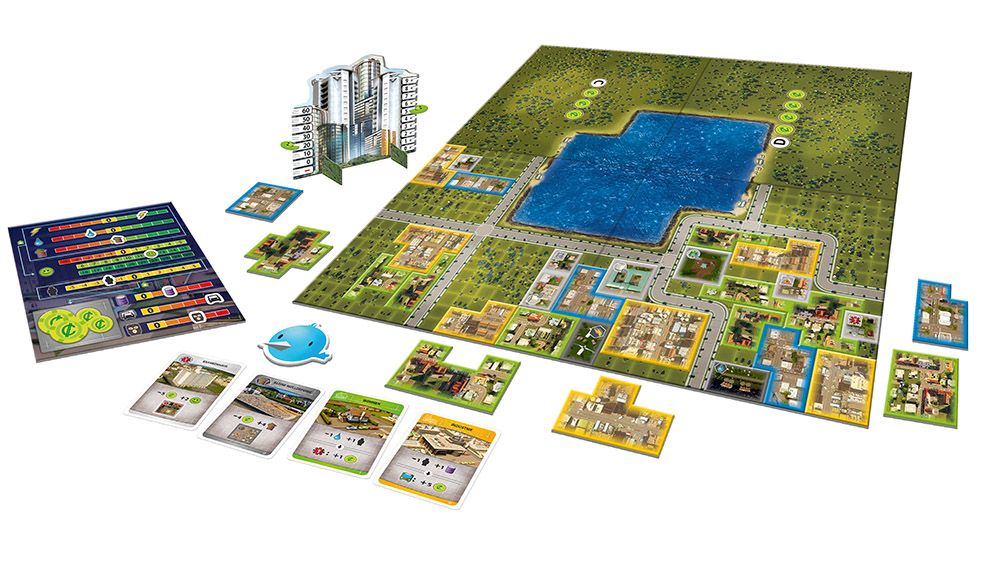Build Districts and Gain Happiness in Cities: Skylines

Plan out and construct prospering neighborhoods in Rustan Håkansson’s adaptation of the popular video game.
Gameplay
Cities: Skylines is a cooperative game for 1-4 players that places everyone as citizens within a growing metropolis. Players will begin with a hand of cards (determined by player count), each representing one of the four zones available in the game (industrial, commercial, residential, and miscellaneous). Three of the six board pieces, each representing part of the city, will be turned faced down. These board pieces have an associated cost of turning them over, and players will begin by deciding which board to turn over first and deducting the cost from the 12 starting dollars from the city’s treasury.
From here, planning begins as players take turns playing cards from their hands to represent particular zones and buildings that they can place on the turned over city board(s) by paying the costs associated with the building. Each player is given three choices for their one action per turn: play a card from their hand, exchange a card from their hand (at the cost of 2 dollars), or complete a milestone. The goal is to create synergistic zones where players can maximize the benefits of the buildings — as well as other influences — in each area surrounded by roads, water, and/or the edge of the city board. These benefits (or hindrances) will not only play out in how much money the city’s treasury has at any time, but also to the city itself via the game’s Administration board.
The Administration board is the heart of Cities: Skylines, as it keeps track of necessities such as power, water, and garbage within the city. These administrative areas impact how much happiness a city is creating for its citizens throughout the course of the game. How you build is also impacted by your starting character and milestones. Each starting character has a benefit that is granted to everyone by fulfilling the criteria on their cards, and each milestone is where happiness points are earned throughout the game.
The game ends when a city fails (such as not enough money in the treasury to pay city costs) or the last milestone has been fulfilled after all city boards have been turned over and two buildings are in each zone. The players add up the amount of happiness they have accumulated and check the game’s manual to see where their point total ranks.

Review
Cities: Skylines is a great exercise in cooperative play. Evaluating everyone’s cards, seeing the costs, and when to play what and where to play it can test any gaming group’s patience. It can be a free-flowing event where everyone happens to have what is needed to pull off a great, fully-functioning city free of hassles, or a disaster of epic proportions where no one is happy, nothing works well together, and the costs of continuing sink the city before it even begins. And do not even begin with the amount of quarterbacking that may occur in three and four player groups.
While Cities: Skylines does not challenge the tried and true conditions of cooperation, it does indulge them in new and fun ways. More often than not, the game unfolds more like an engine builder and less like a game where just hanging is the point of the game. This is not a white-knuckled adventure but a game where thinking a few steps ahead as a group will produce a city that feels vibrant and prosperous. There will be struggles early with a limited treasury, managing a fiddly administrative board, and maximizing each player’s character benefits and milestones, but the puzzle it offers is exciting when everyone is a cog in the city’s well-doing.
However, games of Cities: Skylines can drag on too long. Much like the video game, it takes some time to ramp up a successful city. Unlike the video game, it’s hard to pack up the board game and take a rest from a game where success is not coming quickly (or at all). And there are instances when a city never comes together due to the luck of the draw, bad planning, or a lack of money.
But Cities: Skylines is a fun, unique twist bridging engine building and cooperative play together where there are no secrets to deduce or hidden plot twists. It’s very much a group effort in finding success or enduring through failure, and this can be its own reward (or butt of an in-joke). A player who has great spatial reasoning can help put polyomino buildings together into a tight zone. A player with a mathematical mind can act as the treasurer and calculate where and how to maximize profits. A player with attention to detail can help figure out where sacrifices need to be made in the short term for long term benefits as an administrator. Every sort of board gamer can find a role to relish in each play and feel like a part of the team, even if the star quarterback acts like the mayor.
Pros: Unique take on cooperative play, fun blend of engine building and resource management
Cons: Games can run too long or too short, failing cities are an endurance test




